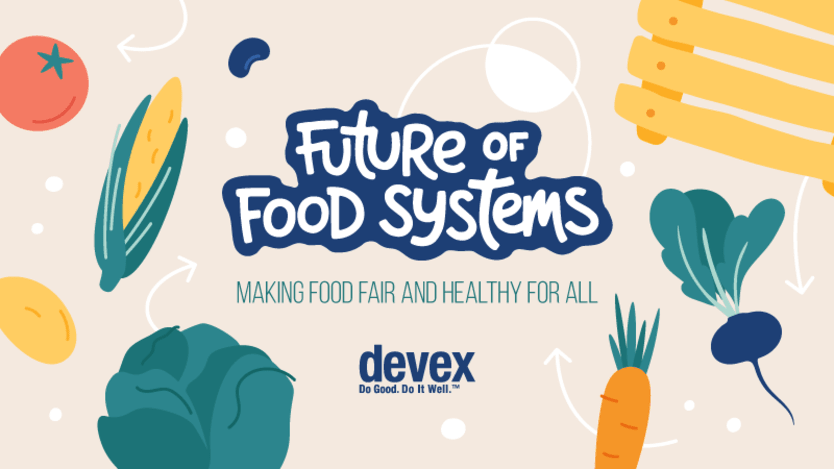
Nutrition experts have raised concerns about the prospect of forthcoming U.K. aid budget cuts and said there is a “lack of clarity” from the government around how much money would be lost and the impact on crucial programs.
The United Kingdom was roundly praised for its history as a global leader in nutrition policy at a meeting of the International Development Committee of politicians Wednesday. Successive governments have committed at least £3.7 billion to nutrition since 2013, according to Wendy Morton, minister at the Foreign, Commonwealth & Development Office.
But experts expressed concern over the impact a shrinking official development assistance budget could have on nutrition programs as the government reduces its aid spending target from 0.7% to 0.5% of national income.
Morton refused to give any details of how nutrition would be funded in the new budget. But privately, a senior campaigner with links to the government told Devex the picture is “very, very gloomy” — despite a key summit, Nutrition for Growth, set to be hosted by Japan in December. The U.K. hosted the first iteration of the event in 2013.
Within FCDO, there are also fears. “Nutrition has been relegated for a while. Lots of country plans have dropped it,” one official told Devex, speaking anonymously because they were not authorized to talk to the media. Nutrition and health issues such as sexual and reproductive rights are “all in danger of being thrown under the bus in the coming hatchet job,” the official added. The source said that “reading between the lines,” the United Kingdom’s global health work is now essentially focused on “protecting the U.K. from foreign diseases.”
A lack of communication with NGOs could “potentially undermine some of the sustainable work” the U.K. government has done on nutrition, Callum Northcote, senior nutrition policy adviser at Save the Children UK, told members of Parliament. He said that of the “broad range of NGOs” he had spoken with, there was still “more than a lack of clarity about the direction and what that will mean for individual programs."
“Nutrition has been relegated for a while. Lots of country plans have dropped it.”
— An FCDO officialHis comments echoed other comments made by NGOs about poor government transparency around the aid cuts. The government recently rejected a Freedom of Information request asking for more details on the budget changes.
“If we are going to see large reductions particularly towards the end of the project cycles [before they are transferred to local governments] … that could really damage the long-term sustainability of some older programs that are moving out of FCDO delivery and moving more towards national ownership,” Northcote said.
Agnes Kalibata, United Nations special envoy for the Food Systems Summit, told MPs she was “disappointed by the lack of enthusiasm by the U.K. government” for the event. Her words echoed a joint statement on nutrition policy from Save the Children UK, the International Rescue Committee, and Action Against Hunger UK earlier in the week, which expressed fears that “the UK is not recognising the scale of the problem, and the strength of its hand in the response.”
Questions also remain over how nutrition policy will be organized in the new FCDO. Morton told MPs that “the work of the nutrition department continues” and will form part of a new global health directorate within the department.
Part of our The Future of Food Systems series
Find out how we can make food fair and healthy for all. Join the conversation using the hashtag #FoodSystems and visit our The Future of Food Systems page for more coverage.
Expert witnesses told IDC that good nutrition policy underpinned key government development commitments, including improving girls’ education and global health security — with malnourished people likely to suffer more severely from COVID-19. Simon Bishop, chief executive officer at The Power of Nutrition, called it a “best buy for international development,” highlighting its impact on other areas.
He told Devex: “We know that if you don't get the right nutrition to children from conception to age 2, they will be physically and mentally stunted, and some of those things are impossible to reverse. That means children arriving in the classroom to get good education — as Boris [Johnson, the prime minister], wants — will by definition be mentally impaired. If you cut nutrition, you are directly undermining your flagship policy.”
Kalibata said nutrition risks were worsening as the effects of climate change grew more severe, particularly in sub-Saharan Africa.
In the future, the government would build on its investment in nutrition, “directing our technical, our financial, and our diplomatic expertise … to support partner governments to strengthen their own policies and systems,” according to Morton. She promised to leverage investments to address malnutrition and improve food systems and pledged to support innovation from individual governments in adapting food systems to climate change-linked crises.
Visit the Future of Food Systems series for more coverage on food and nutrition — and importantly, how we can make food fair and healthy for all. You can join the conversation using the hashtag #FoodSystems.









